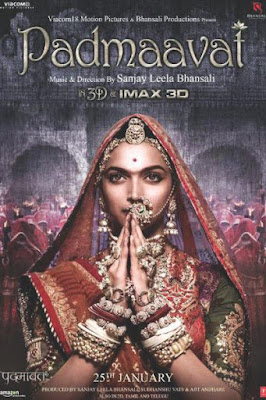Padmaavat is a film to be enjoyed on its merit, despite the atrocious demands of covering up Deepika’s revealing waist, the alleged deleted scenes, and lengthy disclaimers.
The source of the movie is the 1540 poem by Malik Muhammad Jayasi. The entire controversy revolving around the movie was the depiction of Rani Padmavati, who is revered as a goddess-like figure in Rajasthan and not as a mere human being. Therefore, the title of the movie had to be changed to Padmaavat from Padmavati. These frankly unfair allegations and accusations were made even more the movie was released. Then there was talk of the glorification of Alauddin Khalji.
The other allegation was concerning who Rajputs have been depicted in Padmaavat. The manner in which the protests were held, and how the administration has been strangely silent about it, led to apprehensions towards the movie’s release. Thankfully, the movie is finally here.
The Honourable Tale
Rajput King Ratan Singh (Shahid Kapoor) falls for Singala Princess Padmavati (Deepika Padukone) and are soon married.
Meanwhile, in distant Afghanistan, Alauddin Khilji (Ranveer Singh) gets his uncle, the reigning Khilji king (Raza Murad) murdered to ascend the throne.
Back at Chittor Fort, Ratan Singh banishes the royal priest Raghav Chetan for playing peeping tom on the couple.
Enraged, Chetan travels to Delhi, enticing Alauddin by describing Padmavati’s beauty to attack Chittor. War looms and Chittor’s fate seems sealed against a larger Khilji army.
Wafer thin plot, Hindi film dialogue-baazi
Despite the detailed grandeur, gorgeous set design, and painstaking costume design, Padmaavat lacks a strong story.
The face-offs between Ratan Singh and Alauddin plays on the Shahid-Ranveer star status rather than logic. Both kings enter each other’s territory unarmed and alone. An escaping king still finds time to part with his subdued rival on a dialogue-laced note, just because he wants to.
The CGI is unimpressive and just about holds, disappointing after what we witnessed in SS Rajamouli’s Bahubali (2015) and Baahubali 2(2017) movies.
The mountains, soldiers, the funeral pyre and falling soldiers look unreal. The action is brief and impressive in bits, the final Rajput-Khilji fight is mockingly contrived with Shahid-Ranveer trading obligatory blows in turns.
What works?
The performances, atmosphere, songs and background score hold the film.
Shahid Kapoor and Deepika Padukone are both compelling, they don’t get as many shades to work on as Ranveer Singh.
Ranveer, clearly enjoying himself, nails a difficult part with menacing, intruding darkness, his character keeps the film above average.
Jim Sarbh makes a decent act of an underwritten, punishing role as a deviant Khilji slave.
Aditi Rao Hydari is lovingly efficient in her bit part as is the baritone veteran Raza Murad. Anupriya Goenka is consistent, though she falters in a key scene.
Rousing Finale
It is in the final dialogue-less 15 minutes that the film comes alive.
The film does end up glorifying self-immolation as a heroic tradition. But seen as a fictional film, this part is both poignant and arousing and makes up for the film’s many flaws. Takeaways from the Ketan Mehta classic Mirch Masala (1987) add to the stunning climax.
The controversy, the irony
Bhansali is clearly partial in depicting Rajputs as honorable, brave, upright warriors and the Khiljis as murderous, cheating, savage barbarians. So, what was the rogue and coercive Karni Sena opposing? Bhansali is totally on their side.
Padmaavat is a decent historical entertainer that does not build on its premise.
It is an attempt in decorated epic-ness but lacks a layered story. Watch it in 2D, the 3D is just a marketing afterthought.
For me, the best Sanjay Leela Bhansali movie is still that classy love triangle Hum Dil De Chuke Sanam (1999).
